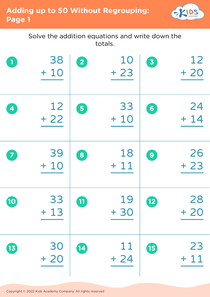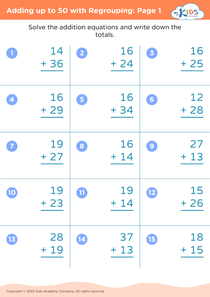Fraction comparison Adding up to 50 Misc Worksheets for Ages 5-7
4 filtered results
-
From - To
Enhance your child’s math skills with our engaging "Fraction Comparison" worksheets, designed specifically for ages 5-7. These fun and interactive resources help young learners grasp the concept of fractions by comparing different parts to learn about value and size. Perfect for enhancing foundational math skills, our worksheets introduce essential concepts like recognizing and comparing fractions in an easy-to-understand manner. Aligned with key educational standards, these miscellaneous activities keep kids motivated while they practice adding up to 50. Unlock your child's potential by making learning enjoyable with our captivating fraction comparison resources that promote critical thinking and problem-solving skills!
Fraction comparison is an essential foundational skill for young learners aged 5-7, as it plays a critical role in developing their mathematical thinking and problem-solving abilities. Understanding fractions helps children grasp the concept of parts of a whole, which is crucial not only in math but also in everyday situations, such as sharing snacks or measuring ingredients for cooking.
Incorporating activities that combine fraction comparison with adding up to 50 enhances their learning experience. These activities engage students by using relatable contexts, making math more tangible and enjoyable. Parents and teachers should care about this because mastering these skills early on helps build confidence, promotes critical thinking, and prepares children for more complex mathematical concepts later in their education.
Moreover, teaching fractions in a fun and interactive manner fosters a positive attitude toward math, reducing anxiety around numbers. As children navigate these concepts, they learn how to make comparisons, enhance their reasoning abilities, and develop a deeper understanding of quantities. Therefore, supporting young learners in mastering fraction comparison and related activities lays a robust foundation for their academic success and encourages a lifelong appreciation for mathematics.















